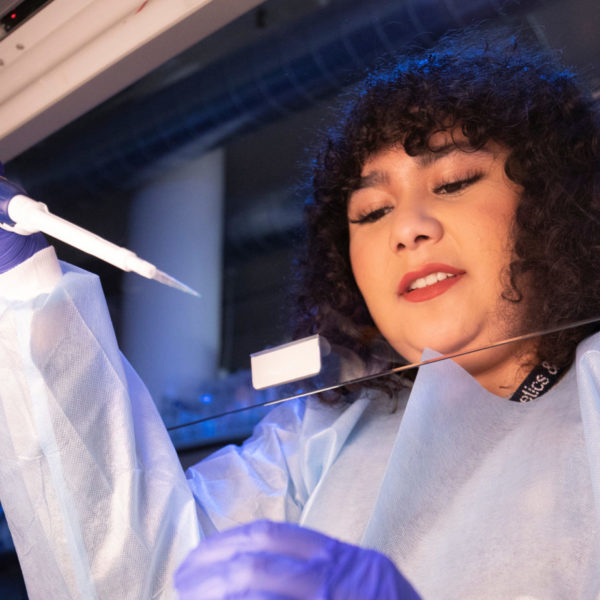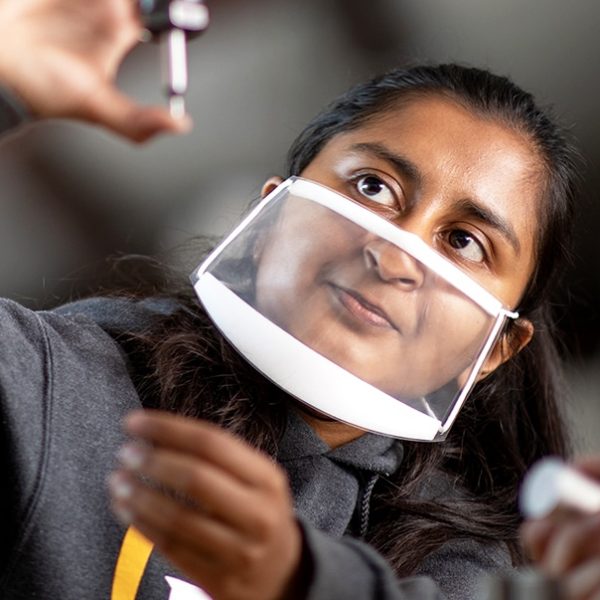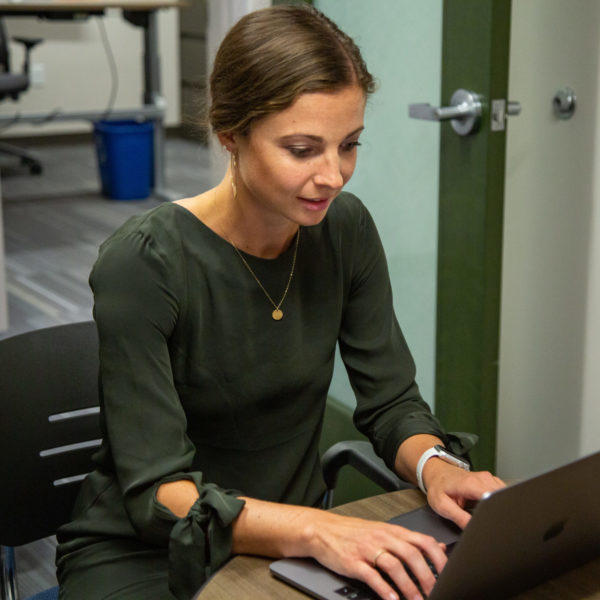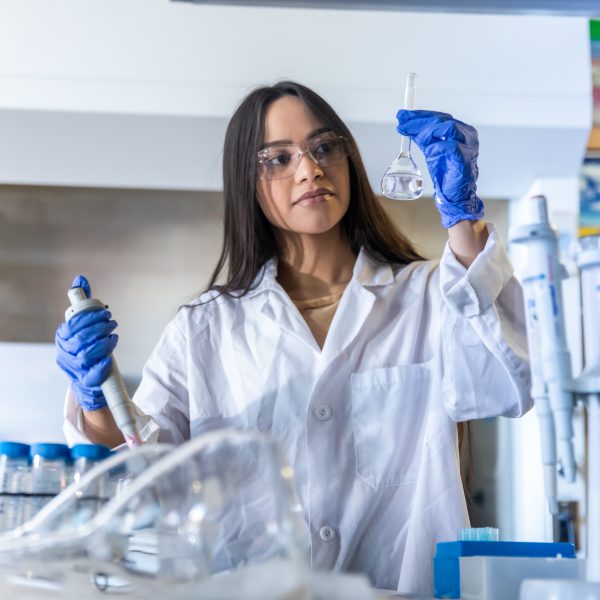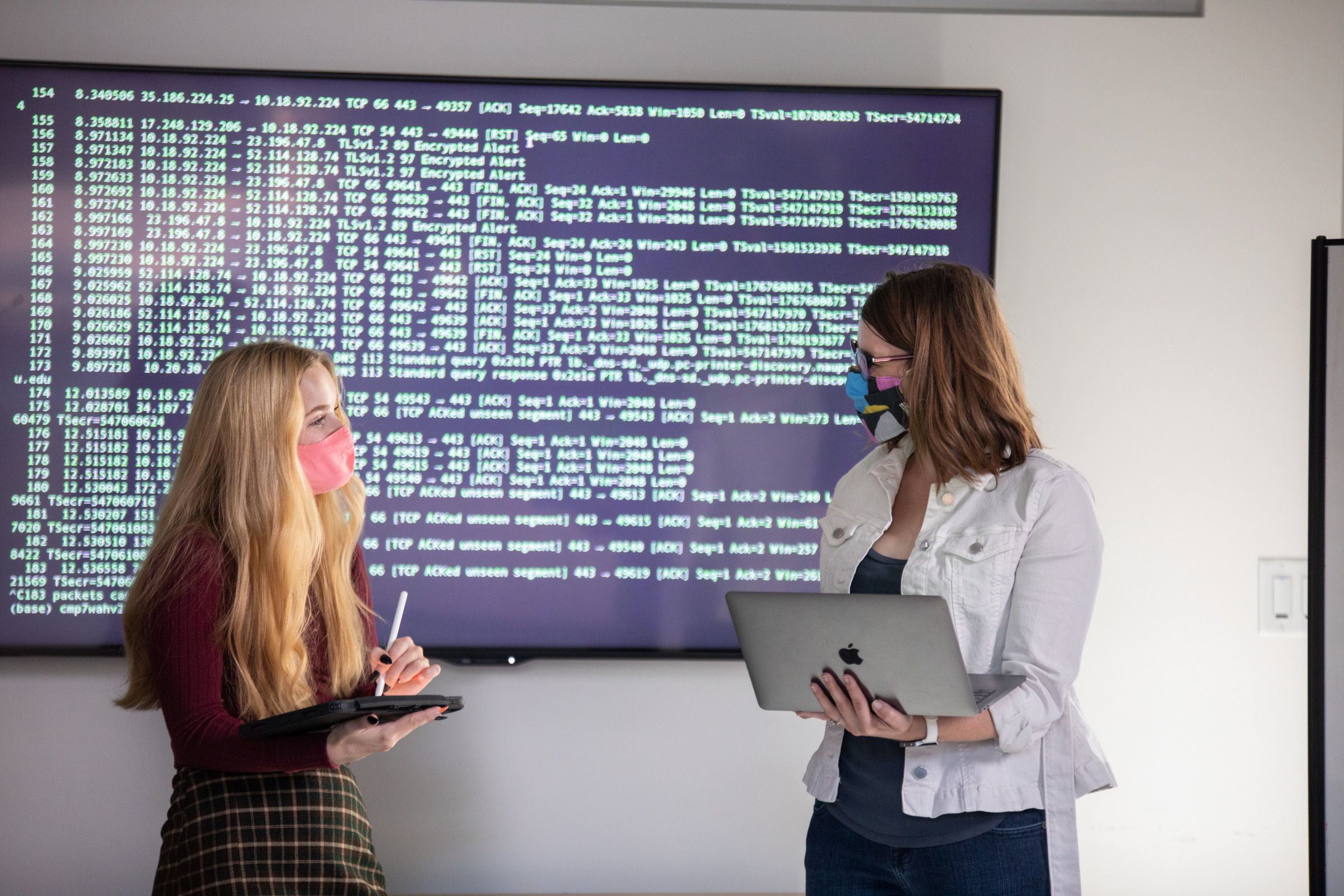
Funded by multiple undergraduate research awards, Computer Science major Shelby Hagemann helped to study and develop a mobile app for mental health.
When you imagine computer science, maybe you see a scene from The Matrix—uranium-green text scrolling in a dimly lit room to the rapid tick of a keyboard. Maybe you envision a sea of cubicles filled with a bunch of nerds and a framed picture of Bill Gates on the wall. But if you’re Shelby Hagemann, you might see a rubber ducky.
“We have this thing in computer science that we call the rubber ducky method,” said Shelby, who is pursuing two degrees, one in Computer Science and the other in Modern Languages, through NAU’s Interdisciplinary Global Programs ( IGP). “The idea is to have some kind of inanimate object [rubber ducky] that you explain your program to,” she said. According to Shelby, this practice of putting things into words can help programmers catch mistakes in their logic. “I’m always talking to myself while I’m programming,” she said.
Aside from the rubber ducky, when Shelby is programming, the scene may differ from the movies in a few other ways. Generally, she enjoys a well-lit room, some instrumental lo-fi beats, and rather than displaying a pessimistic scowl and impatient disposition, she’s far more likely to be delighted.
“Writing computer programs is almost like solving puzzles,” she said. “It’s really fun building something from the ground up and spending all this time programming and finally seeing that it actually works and does what you were hoping it would do.”
Shelby has always had a love of puzzles. Growing up, her favorite game was the logic-driven Professor Layton series on the Nintendo DS. But she was not always interested in computer science.
“I originally wanted to major in math, but in high school I got a little intimidated by it, because as much as I loved math, sometimes I didn’t get the best grades in it,” she said. “I knew computer science was really similar, and I thought, why not give it a try for a semester to see if I like it? And I ended up loving it.”
I’m so thankful that I’ve been able to branch out while I’ve been here and try out all of these different things, because it’s really helped me figure out what I enjoy. I’m really happy to go to a school that has so many opportunities.
While Shelby’s motivation to study computer science was initially rooted in her enjoyment of the craft, at NAU she found undergraduate research opportunities that inspired her to apply her learning to real-world problems. Through the Interns-to-Scholars program, she connected with Dr. Morgan Vigil-Hayes, an Assistant Professor in the School of Informatics, Computing, and Cyber Systems. In Dr. Vigil-Hayes’ research lab, Shelby developed software and ran user studies for a project focused on investigating a culturally responsive design of behavioral health apps. She also co-authored a manuscript that was accepted for publication in one of the top computer science venues for research on human-computer interaction.
Then, Shelby extended the work of Dr. Vigil-Hayes to her own independent research. To fund her research, she applied for and received both the Hooper Undergraduate Research Award and the Jean Shuler Research Mini-Grant. These grants allowed Shelby to continue to research and develop a mobile app designed to be an easily available mental-health resource, which became unexpectedly personal for Shelby.
“A few months before my mentor asked if I wanted to apply for this research grant, a friend of mine committed suicide,” she said. “And it just made me realize how important having access to mental health treatment and counseling is. These apps could be helpful, maybe not everything, but they could help people.”
One way that Shelby has supported her mental health is by being active in a number of NAU’s community organizations. She joined a sorority, served as president for NAU’s Association for Computing Machinery Club, and sat as a board member for NAU’s chapter of Women Who Compute.
“It just makes going to school way more fun,” she said. “I wish I could go back in a time machine and tell myself: I know you’re having a good time now, but you’ll be even happier if you join clubs.”
With a major she enjoys, opportunities and funding to pursue impactful research, and a thriving community, Shelby has a lot to be happy about. For the cherry on top, at the time of this interview, she was packing to study abroad in Germany. There, she will concentrate on the German emphasis for her Modern Languages degree. She’s nervous and excited about this shift in focus, but as it turns out, Modern Languages and Computer Science have something in common: linguist and social critic Noam Chomsky.
“He has an algorithm for language development, and we talked about him a lot in my linguistics and German classes, so there have been a few semesters where all I learned about was Noam Chomsky,” she said with a laugh.
After finishing her two degrees, Shelby intends to go to graduate school. She might continue a path in research—or dive into a career of software engineering. Either way, she doesn’t need to talk with a rubber ducky to know that NAU has set her up for success.
“I’m so thankful that I’ve been able to branch out while I’ve been here and try out all of these different things, because it’s really helped me figure out what I enjoy,” she said. “I’m really happy to go to a school that has so many opportunities.”




